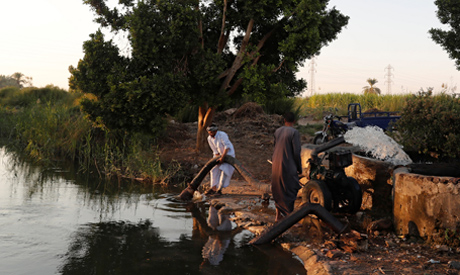
Using SPIS to irrigate agricultural land will improve the life of peasants
Eighty-five per cent of Egypt’s water is consumed by agriculture, so rationalisation of water used in irrigation is a must, Dalia Sakr, an energy and environment consultant, told the Weekly on the sidelines of the regional dialogue on the benefits, risks and policy options of Solar Powered Irrigation Systems (SPIS) in the Arab region.
The discussion, held recently in Cairo, promoted the use of renewable energy such as solar power to irrigate agricultural land.
Climate change will cause desertification and water scarcity “which means that food security will be threatened,” Sakr said.
Tunisia has been using SPIS since 2015. Sub-Director of Agricultural Water Operations in Tunisia Kamal Al-Moaddab said the standard of living and lifestyle of peasants will improve after using SPIS which will lessen the burdens of pumping with electricity and diesel.
Khaled Bedoui, energy expert from from Tunisia, told participants that grants are being given to farmers to encourage them to use SPIS.
Attended by more than 40 experts, the dialogue was organised by GIZ, the German development organisation, Nexus Regional Dialogue for the Middle East and North Africa Region, the Food and Agriculture Organisation (FAO), the Arab Organisation for Agricultural Development (AOAD) and the League of Arab States (LAS). The Nexus Regional Dialogue Programme works on translating conceptual considerations into specific policy-making processes.
According to Nesrin Lahham of the Nexus Dialogue Programme and coordinator of the MENA region, SPIS represents one of the fastest growing applications throughout the Arab region. “This is mainly due to the radical phase-out of power and diesel subsidies, the decreasing costs of PV systems across the region and governmental subsidies of SPIS in some countries,” Lahham said.
Regarding the Sudanese experience, “SPIS represents an excellent alternative to diesel in small plantations,” Hashim Al-Tayeb, director of the irrigation sector at the Ministry of Agriculture and Natural Resources in Sudan, told Al-Ahram Weekly. “It could also be used in modern irrigation as sprinkler irrigation. Using solar energy in plantation investments could guarantee Arab food security by expanding vertically and horizontally in plantation, as well as managing water resources ideally,” Al-Tayeb said.
Al-Tayeb explained to the Weekly that Sudan started to spread the culture of using solar energy in irrigation in 1982. “Using solar energy guarantees the continuity of irrigation whereas there could be many problems regarding using diesel. There are also many areas that are far from electricity resources and can make good use of solar energy in pumping ground water and increasing cultivated areas and land productivity accordingly,” he said.
“In 2019 there was no diesel in Yemen,” Ibrahim Al-Qadasi, water and irrigation engineer at FAO, said in his presentation about the Yemeni experience using SPIS. According to Al-Qadasi, Yemen is a country that needs SPIS the most because of the shortage of diesel as well as water. Al-Qadasi said diesel pumps cost a small fortune. He said the government supports farmers by providing financial facilities for the use of solar powered pumps, but that despite these efforts, “lots more is needed, including increased awareness among Yemeni farmers to use solar pumpers, obliging farmers to use modern irrigation systems, and distributing solar pumpers across the Yemeni republic”, Al-Qadasi said.
“The water scarcity that Egypt is facing now is a national security issue,” energy consultant Sakr told the Weekly. “Responsibilities should be determined between ministries. Information should be made available, there should be an increase in supporting the usage of latest technologies in irrigation, raising farmers’ awareness in technical matters, finding creative solutions for issues and understanding the importance of legislation of laws to activate the usage of technology and benefit from it.”
On a similar note, Kamel Amer, Chairman of the Arab Organisation for Agriculture Development, worries that the fact that solar energy is free may encourage some farmers to use it without control and draw excessively on underground water.
Short link: